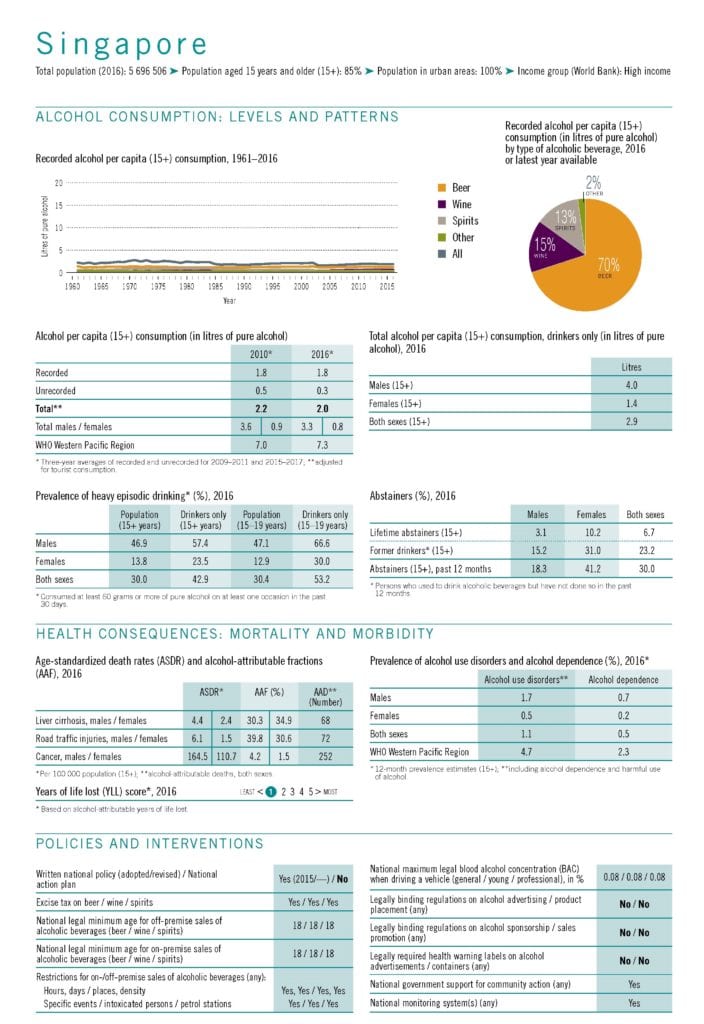The annual National Population Health Survey 2020, conducted by the Ministry of Health (MOH) in Singapore, reveals that binge alcohol use is on the rise in the country. Singapore defines binge alcohol use as consuming five or more alcohol units for men and four or more for women in one occasion.
However, science has shown that there is no safe level for alcohol use. The risk of developing diseases such as cancer from alcohol increases with the amount of alcohol consumed. Therefore, the guidelines released by governments help citizens reduce risk, but do not eliminate risk. In fact even low-dose alcohol use causes cancer and increases the risk of atrial fibrillation or irregular heartbeat and decreases brain volume.
The MOH study found that young adults between between the ages of 18 to 39 years were the most at risk of binge alcohol use.
Persistent alcohol norms and alcohol myths among this age group are one possible reason for this harmful trend to be rising. Many young adults do not believe they are bingeing on alcohol even though when they explain their use it falls within the range of binge alcohol consumption. They also have misconstrued ideas about what binge alcohol use looks like – beliefs shaped by pervasive alcohol marketing.
The ongoing COVID-19 pandemic has added to the rising alcohol problem in Singapore. Starting early on in the pandemic, the alcohol industry marketed alcohol as a coping mechanism, despite the lethal interaction between alcohol and COVID-19.
The lethal interaction between alcohol and the COVID-19 pandemic was revealed in a groundbreaking report.
- Alcohol increases the health and societal problems arising from the pandemic. For example, alcohol weakens the immune system and makes people more susceptible to infections. And alcohol-centric social contexts have been COVID-19 super spreader events.
- Alcohol increases the burden on healthcare and emergency services which are already stretched due to the COVID-19.
- The alcohol industry exploits the pandemic to change alcohol laws to their private benefit.
Since alcohol increases the risk of contracting the coronavirus and its complications and because of other negative combined effects of alcohol and COVID-19, the World Health Organization has advised to reduce alcohol use during COVID-19 lockdowns.
In Singapore, as in many other countries, alcohol industry pandemic marketing coupled with alcohol delivery has led to a rise in alcohol use.
According to the MOH survey, in the first pandemic year, 10.5% of respondents said they engaged in binge alcohol use, up from 8.8% in 2017.
However, the alcohol problem in Singapore was already growing long before the pandemic. As Movendi International previously reported in 2018 and 2019.
The government’s plan to reduce binge alcohol use includes raising awareness, a good starting point. Nevertheless, more can be done in terms of policy solutions to reduce the growing alcohol problem in Singapore.
As the WHO Global Status Report on Alcohol for 2018 reports, Singapore’s minimum age for alcohol use is on the lower side at 18 years. Furthermore, the country does not have any regulations in place to protect people from alcohol marketing such as for advertising, product placement, sponsorship and promotions.
Scientific evidence shows that exposure to alcohol marketing increases initiation to alcohol use and drives binge and high risk alcohol use behaviors among young people. This is also true of exposure to digital alcohol marketing, such as on social media or on websites as well. A recent systematic review highlights that alcohol marketing exposure is related to young peoples’ alcohol use behaviors.
Improving alcohol marketing regulations is one of the alcohol policy best buys, recommended by the World Health Organization, for governments aiming to prevent and reduce alcohol harm in their countries. It is one policy solution that the Singaporean government can invest in to specifically reduce youth binge alcohol use and thus promote health and well-being.

